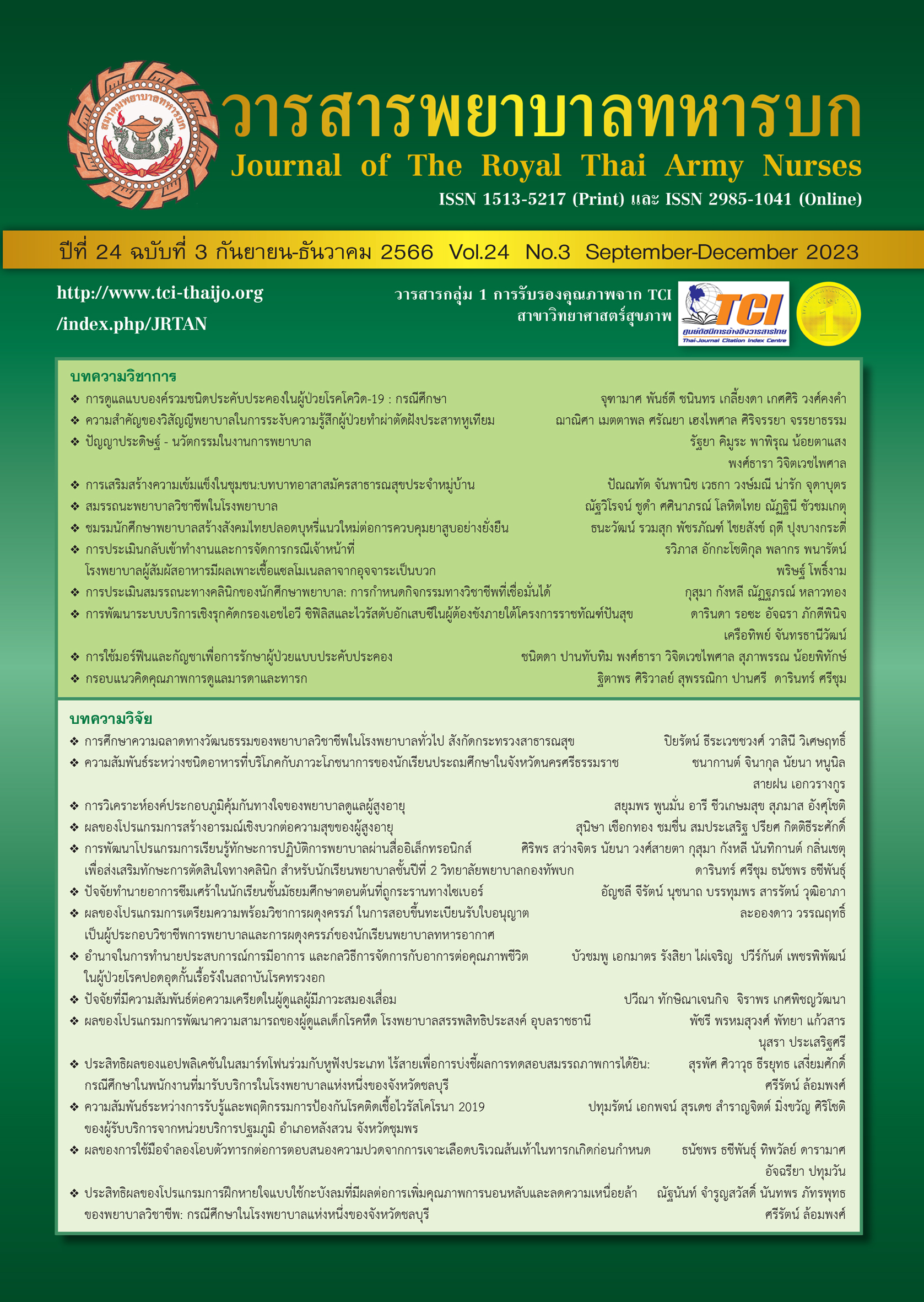Predictors of Executive Function Development in Preschool-Age Children
Keywords:
Executive function development, Temperament, Preschool-Age ChildrenAbstract
Executive function development is important that effect on the abilities successful life from infancy through adulthood. This predictive correlational research aimed to study the level of executive function development and predicting factors of executive function development in preschool children. A multi-stage random sampling was used to recruit a sample of 87 mothers and their preschool children who were receiving service at child care centers in the municipality of Chonburi province. Research instruments included a demographic questionnaire, the Home Observation for the Measurement of Environment (HOME), the child temperament questionnaire, executive function development in preschool child questionnaire. Data were analyzed by using descriptive statistics and stepwise multiple regression
Results showed that the overall executive function of preschool children was at good level. ( = 57.38, SD = 6.74). The child temperament was significant predictor of the development of executive function skill among preschool children (R2 = .210, p < .05) These findings suggest that nurses and health care providers should promote for child temperament. Consequently, preschool children would have more appropriate executive function development.
Downloads
References
Anderson P. Assessment and development of executive function (EF) during childhood. Child Neuropsychology 2002;8(2):71-82.
Chutabhakdikul N, Thanasetkorn P, Lertawasdatrakul O. Tool development and evaluationcriteria for assessment of executive function in early childhood. Nakhonpathom: Institute of molecular biosciences, Mahidol university publishing; 2017. (in Thai)
Diamond A. Executive functions. Annual Review of Psychology 2013;64(1):135-68
Mulder H, Verhagen J, Van Der Ven HG, Slot P, Leseman Paul P.M. Early Executive Function at Age Two Predicts Emergent Mathematics and Literacy at Age Five. Frontiers in Psychology. 2017;8(1):1-18.
Volckaert A, Noël MP,. Executive Function, Chaos and Temperament: Specificities in Preschoolers with Externalizing Behaviors. Psychol Belg 2018;58(1):222-42.
Jennifer L, Lindsey B, Stephanie S, Jaline K, Sophie E,. Relationship between Social Cognition and Temperament in Preschool-aged Children. Infant and Child Development. 2017;26(2): 19-81.
Geers, M.C.K. Temperament and executive function problems in preschoolers. Netherlands: Leiden University; 2013.
Korucu I, Rolan E, Napoli AR, Purpura DJ, Schmitt SA. Development of the Home Executive Function Environment (HEFE) Scale: Assessing its relation to preschoolers’ executive Function. Early Childhood Research Quarterly 2019;47(2):9-19.
Chonchaiya, V. Effects of Electronic Screen Media on Children and Adolescents. Bangkok: Beyond enterprise; 2018.
Chonchaiya, V. Guidelines for Determining the Appropriate Age Range for Children to Use Online Media Through Smartphones and Tablets. Faculty of MedicineChulalongkorn University-Siriraj Hospital. Department of Development and Growth Department of Pediatrics Faculty of Medicine Chulalongkorn University; 2018 (in Thai)
Phinthong, B. Chaimongkol, N., & Pongjaturawit, Y. Family Factors Related to Executive Function Development in Preschool Children. The Journal of Faculty of Nursing, Burapha University.2018;26(2):20-9. (in Thai)
Lefa B,.The Piaget`s theory of cognitive development : An Educational Implication. Educational Psychology; 2014.
Labnok S, Pongjaturawit Y, Chaimongkol N. Predictors of Executive Function Development in Preschool Children. Journal of Bamrasnaradura Infectious Diseases Institute. 2020; 14(3): 56-67. (in Thai)
Sangsai, N., Chaimongkol, N., & Phaktoop, M. Predictors of adaptive behavior of preschoolers receiving service in child daycare center. The Journal of Faculty of Nursing, Burapha University.2011;19(2):97-109. (in Thai)
Seamkhumhom D, Nookong A, Rungamornrat S, Chutabhakdikul N. Factor related of executive functions in preschool-aged children. Thai Journal of Nursing Council. 2019;34(4):80-94. (in Thai)
Office of the Education Council. National standard for early childhood care, development and education; 2019. (in Thai)
Leungratanamart, L., Sudjainark, S., Wattanaviro, N., & Meelai, W. Factors Influencing the Executive Function in Preschool-Age Children. Nursing Journal of the Ministry of Public Health. 2021;31(3):15-27. (in Thai)
Thonhinong U, Boonyapak P, Kodyee S. Predictive Factors of Parentral Behaviors on Promote Development of Executive Functions (EF) Skills among Early Childhood in Chaing Rai Province. Journal of The Royal Thai Army Nurse. 2022;23(1):344-52. (in Thai)
Phueakphet, N.,Thanasetkorn, P., Seree, P. The Impact of Learning-Experience A ctivities Based on Trisikkha Principle and EF Guideline on Preschoolers’ Self-Regulation Skills. Ratchaphruek Journal. 2022; 20 (3):59-72. (in Thai)
Downloads
Published
How to Cite
Issue
Section
License
Copyright (c) 2023 Journal of The Royal Thai Army Nurses

This work is licensed under a Creative Commons Attribution-NonCommercial-NoDerivatives 4.0 International License.
บทความหรือข้อคิดเห็นใดใดที่ปรากฏในวารสารพยาบาลทหารบกเป็นวรรณกรรมของผู้เขียน ซึ่งบรรณาธิการหรือสมาคมพยาบาลทหารบก ไม่จำเป็นต้องเห็นด้วย
บทความที่ได้รับการตีพิมพ์เป็นลิขสิทธิ์ของวารสารพยาบาลทหารบก
The ideas and opinions expressed in the Journal of The Royal Thai Army Nurses are those of the authors and not necessarily those
of the editor or Royal Thai Army Nurses Association.






